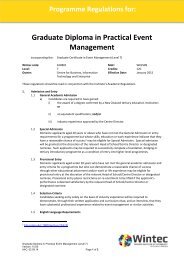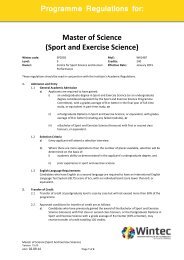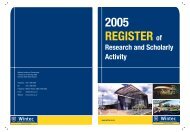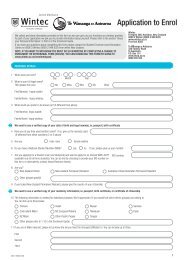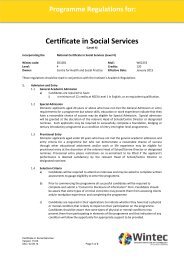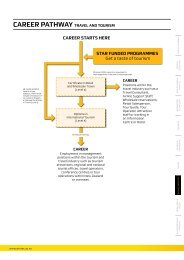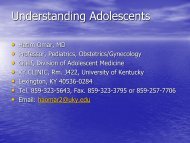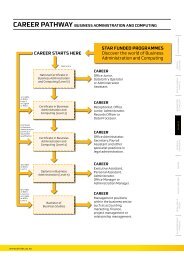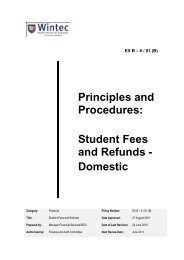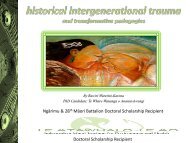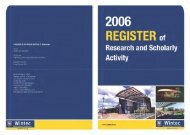NNS teachers - Wintec Research Archive
NNS teachers - Wintec Research Archive
NNS teachers - Wintec Research Archive
You also want an ePaper? Increase the reach of your titles
YUMPU automatically turns print PDFs into web optimized ePapers that Google loves.
Developing an identity as<br />
a teacher:<br />
Perceptions of nonnative speaker<br />
teacher trainees on a TESOL<br />
programme<br />
Sue Edwards<br />
Waikato Institute of Technology (WINTEC)
“Half students in our class are non-native<br />
speakers. Many of us including me want to be<br />
an English teacher. However, as non-English<br />
native speakers, are we able to become a good<br />
English teacher here? What are the advantages<br />
and disadvantages of it? What should we do to<br />
achieve this goal?<br />
I'd like to know about your opinions.”
Overview<br />
NS and <strong>NNS</strong> in ELT<br />
The research<br />
Findings<br />
Reflections
NS and <strong>NNS</strong> <strong>teachers</strong> in ELT<br />
1961 Commonwealth Conference on the<br />
Teaching of English as a Second<br />
Language: The ideal teacher of English is<br />
a native speaker .<br />
Differences between, and status of, NS<br />
and <strong>NNS</strong> <strong>teachers</strong> addressed in late<br />
80s/early 90s.<br />
The ‘native speaker fallacy’ (Phillipson, 1992)
<strong>NNS</strong> <strong>teachers</strong> (NNESTs) in ELT<br />
More than 80% of ELT professionals<br />
internationally are non-native speakers.<br />
The number of NNESTs has been larger<br />
than the number of NESTs for some time.<br />
(Canagarajah, 1999)
Unique strengths of NNESTs<br />
Can serve as imitable models of the successful<br />
learner of English<br />
Can teach language-learning strategies more<br />
effectively<br />
Can provide learners with more information<br />
about the English language<br />
Are more able to anticipate language difficulties<br />
of their students<br />
Can be more empathetic to the needs and<br />
problems of their learners<br />
Can benefit from sharing the learners’ mother<br />
tongue. (Medgyes, 1999)
Non-native speakers in ELT<br />
NNESTs suffer from:<br />
– Inferiority complex<br />
– Schizophrenia (Medgyes, 1999)<br />
“NNESTs struggle for equal treatment in the<br />
ELT profession” (Maum, 2002)<br />
A high percentage of <strong>NNS</strong> <strong>teachers</strong> believed<br />
that NS <strong>teachers</strong> were superior in all language<br />
skills areas: speaking (100%), pronunciation<br />
(92%), listening (87%), vocabulary (79%), and<br />
reading (72%). (Tang (1997)
The TESOL programme<br />
Introductory level TESOL qualification:<br />
– Cert in ELT (Level 5 NZQA)<br />
– Grad Cert TESOL (Level 6 NZQA)<br />
1 semester (12/15 weeks) full-time<br />
Accept those with and without a degree<br />
Accept NS and <strong>NNS</strong> students<br />
Interview and selection task<br />
IELTS level 6 or equivalent required
The participants<br />
15 out of 22 <strong>NNS</strong> trainees who had completed a<br />
TESOL programme in the previous 18 months<br />
(2006-2007)<br />
9 different L1<br />
Previous Qualifications: Certificate to Masters<br />
Previous Teaching Experience: 12 of 15<br />
(8 had used English as medium of instruction)
The Methodology:<br />
Questionnaire:<br />
– Qualitative items: Experiences (8)<br />
– Quantitative items: Perceptions (4)
1<br />
English<br />
language<br />
knowledge<br />
and skills<br />
Aims<br />
2<br />
Teaching<br />
knowledge<br />
and skills<br />
4<br />
Comparison<br />
of NS and<br />
<strong>NNS</strong> <strong>teachers</strong><br />
in general<br />
3<br />
Teaching<br />
knowledge<br />
and skills<br />
compared to<br />
NS <strong>teachers</strong>
Findings (1)<br />
Participants’ rating of their own English<br />
language knowledge and skills
Participants' rating of their own English language<br />
knowledge and skills<br />
Listening skills in English<br />
Reading skills in English<br />
Knowledge of English grammar<br />
Knowledge of English vocabulary<br />
Knowledge of everyday spoken English<br />
Fluency in speaking English<br />
Pronunciation of English<br />
Accuracy in speaking English<br />
Writing skills in English<br />
4.71<br />
4.57<br />
4.36<br />
4.29<br />
4.20<br />
4.07<br />
4.00<br />
3.93<br />
3.71<br />
0 1 1 2 2 3 3 4 4 5 5<br />
Average rating
Findings (2)<br />
Participants’ rating of their own<br />
teaching knowledge and skills
Participants' rating of their own teaching knowledge and skills<br />
I understand how English language learners learn<br />
English<br />
I have a good understanding of English language<br />
learners' cultural backgrounds<br />
I can help English language learners to understand<br />
new or difficult vocabulary<br />
I can help English language learners to learn how to<br />
read in English<br />
I can explain the grammar of English to English<br />
language learners<br />
I have a good knowledge of English grammar<br />
I can help English language learners to understand<br />
colloquial or everyday spoken English<br />
I can help English language learners to learn how to<br />
w rite in English<br />
I can help English language learners with their English<br />
pronunciation difficulties.<br />
I can provide a good model of English pronunciation for<br />
English language learners<br />
5.14<br />
5.13<br />
4.86<br />
4.80<br />
4.67<br />
4.67<br />
4.43<br />
4.36<br />
4.27<br />
4.13<br />
0 1 2 3 4 5 6<br />
Average
Participants' rating of teaching skills<br />
Vocabulary<br />
Reading<br />
Grammar<br />
Spoken English<br />
Writing<br />
Pronunciation<br />
Model pronunciation<br />
4.86<br />
4.8<br />
4.67<br />
4.43<br />
4.36<br />
4.27<br />
4.13<br />
0 1 2 3 4 5 6<br />
Average
Findings (3)<br />
Participants’ rating of their own teaching<br />
knowledge and skills compared to NS<br />
<strong>teachers</strong>
Comparison with NS <strong>teachers</strong><br />
Comparison with NS <strong>teachers</strong><br />
Participants' rating of themselves<br />
Understand how learners learn English<br />
Understand learners' cultural backgrounds<br />
Help learners to understand new or difficult<br />
vocabulary<br />
Help learners to read in English<br />
Knowledge of English grammar<br />
Explain the grammar of English to learners<br />
Help learners to understand everyday spoken<br />
English<br />
Help learners to write in English<br />
Help with English pronunciation difficulties.<br />
Provide a good model of English pronunciation<br />
0 1 2 3 4 5 6
Discussion:<br />
Rating of teaching skills compared to<br />
NS <strong>teachers</strong><br />
Own teaching skills<br />
Comparison with NS<br />
1) Vocabulary<br />
2) Reading<br />
3) Grammar<br />
4) Everyday spoken English<br />
5) Writing<br />
6) Pronunciation<br />
7) Providing a good model of<br />
English pronunciation<br />
1) Vocabulary<br />
2) Grammar<br />
3) Reading<br />
4) Writing<br />
5) Pronunciation<br />
6) Everyday spoken English<br />
7) Providing a good model of<br />
English pronunciation
Findings (4)<br />
Participants’ rating of the teaching<br />
knowledge and skills of NS and<br />
<strong>NNS</strong> <strong>teachers</strong> in general
NS <strong>teachers</strong> rated more highly<br />
NS <strong>teachers</strong><br />
<strong>NNS</strong> <strong>teachers</strong><br />
Providing a good model of English<br />
pronunciation for learners<br />
Teaching learners about everyday spoken<br />
English<br />
Helping learners to correct errors when<br />
speaking English<br />
Helping learners to correct errors when<br />
writing English<br />
Teaching learners how to write in English<br />
Helping learners with pronunciation<br />
difficulties<br />
0 1 2 3 4 5 6
<strong>NNS</strong> <strong>teachers</strong> rated more highly<br />
NS <strong>teachers</strong><br />
<strong>NNS</strong> <strong>teachers</strong><br />
Teaching new or difficult vocabulary<br />
Understanding how English language<br />
learners learn English<br />
Understanding learners’ cultural<br />
backgrounds<br />
Explanation of English grammar to English<br />
language learners<br />
Knowledge of English grammar<br />
Teaching learners how to read in English<br />
0 1 2 3 4 5 6
Who is the better teacher – NS or <strong>NNS</strong>?<br />
1<br />
0<br />
14<br />
A native speaker of<br />
English will generally<br />
be better at teaching<br />
English<br />
A non-native speaker<br />
of English will<br />
generally be better at<br />
teaching English<br />
It is difficult to predict<br />
who will make the<br />
best English language<br />
teacher
Themes emerging from the results<br />
A fairly high degree of confidence in their<br />
ability to do the job of an ESOL/EL teacher<br />
Clear areas where participants feel that<br />
<strong>NNS</strong>s are more proficient than NSs, and<br />
others where they feel they are less<br />
proficient<br />
They do not see NS <strong>teachers</strong> as being<br />
automatically better than <strong>NNS</strong> <strong>teachers</strong>.
Reflections<br />
How many <strong>NNS</strong> <strong>teachers</strong> work in your<br />
institution?<br />
What is the proportion of NS/<strong>NNS</strong><br />
<strong>teachers</strong>?<br />
Do <strong>NNS</strong> <strong>teachers</strong> experience<br />
discrimination from employers in NZ?<br />
How do NS <strong>teachers</strong> view <strong>NNS</strong> <strong>teachers</strong>?<br />
What are the attitudes of NS <strong>teachers</strong><br />
towards <strong>NNS</strong> <strong>teachers</strong>?
Recommendations from previous<br />
research regarding the training of <strong>NNS</strong><br />
<strong>teachers</strong> (cont.)<br />
Provide English language training for <strong>NNS</strong><br />
trainees.“…for <strong>NNS</strong> English <strong>teachers</strong> to be effective,<br />
self-confident, and satisfied professionals, first, we have<br />
to be near-native speakers of English” (Medgyes, 1999)<br />
Provide <strong>NNS</strong> trainees with instruction and support in key<br />
areas (Liu, D., 1999)<br />
Provide a separate course for <strong>NNS</strong> trainees, focussing<br />
on EFL teaching in non-Western/their home country<br />
settings<br />
(Carrier, 2003)<br />
Provide a forum to discuss issues and concerns relating<br />
to ELT professionals from diverse backgrounds (Samimy and<br />
Brutt-Gifler, 1999)
Are we drawing on “the unique insights<br />
Periphery professionals can provide from<br />
their experience and background” ?<br />
(Canagarajah, 1999, p. 87)
Recommendations regarding the training<br />
of <strong>NNS</strong> <strong>teachers</strong><br />
Offer classes that would increase the confidence<br />
<strong>NNS</strong> have of their language and teaching skills<br />
(Berry, 1990)<br />
Both NS and <strong>NNS</strong> could benefit from courses in<br />
grammar, pronunciation, vocabulary and culture<br />
(Cullen, 1994)<br />
Teach the value of collaboration between NS and<br />
<strong>NNS</strong> <strong>teachers</strong><br />
Show NS and <strong>NNS</strong> how to take advantage of their<br />
respective strengths and weaknesses (Matsuda & Matsuda,<br />
2004)<br />
Integrate instruction on issues related to <strong>NNS</strong><br />
across the whole teacher training curriculum. Kamhi-<br />
Stein, 2004)



